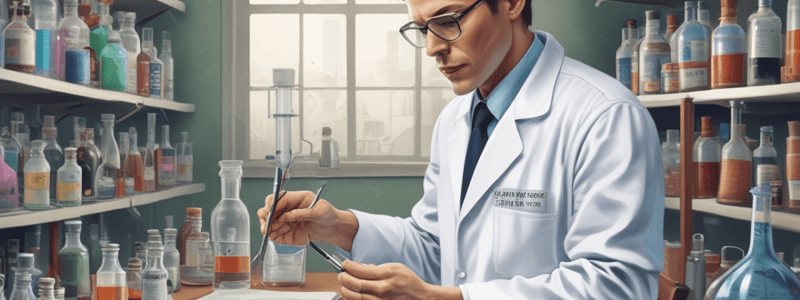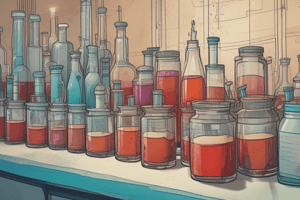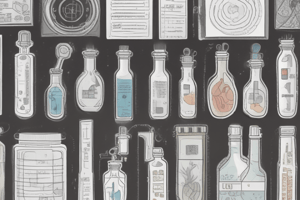Podcast
Questions and Answers
What type of urine sample is commonly used for pregnancy tests?
What type of urine sample is commonly used for pregnancy tests?
- Random
- Mid Stream Urine (MSU)
- First Morning (correct)
- 24 hr Urine Collections
What is the primary purpose of collecting swab samples?
What is the primary purpose of collecting swab samples?
- To collect urine samples
- To collect blood samples
- To look for disease causing microorganisms (correct)
- To look for non-pathogenic microorganisms
What type of stool sample is used for occult blood testing?
What type of stool sample is used for occult blood testing?
- Stool for Ova, Cysts and Parasites
- Stool for M/C/S
- 24 hour stool collection
- Random (correct)
What is the importance of abstinence before collecting a semen sample?
What is the importance of abstinence before collecting a semen sample?
What is the recommended transportation condition for swab samples?
What is the recommended transportation condition for swab samples?
What is the primary difference between sputum and saliva?
What is the primary difference between sputum and saliva?
What type of urine sample is used for urine cultures?
What type of urine sample is used for urine cultures?
What is the importance of a phlebotomist knowing the types of laboratory tests?
What is the importance of a phlebotomist knowing the types of laboratory tests?
What is the time frame to bring a semen sample to the lab?
What is the time frame to bring a semen sample to the lab?
What is the common cytological test used to study cells?
What is the common cytological test used to study cells?
What is the purpose of special stains in cytological tests?
What is the purpose of special stains in cytological tests?
What is the importance of prompt preservation in handling biopsy samples?
What is the importance of prompt preservation in handling biopsy samples?
What is the main advantage of Point-of-Care Tests (APOCT)?
What is the main advantage of Point-of-Care Tests (APOCT)?
What is the main focus of Point-of-Care Tests (APOCT)?
What is the main focus of Point-of-Care Tests (APOCT)?
What type of sample is studied in histology?
What type of sample is studied in histology?
What is the common rejection criterion for cytological tests?
What is the common rejection criterion for cytological tests?
Flashcards are hidden until you start studying
Study Notes
Laboratory Samples
- Types of laboratory samples: Blood, Non-Blood (Urine, Stool, Swabs, Semen, Sputum, Cytological, Histological)
- Phlebotomist should know the importance of common lab tests
Urine Samples
- Types of urine samples:
- Random (Drugs of Abuse, Microalbumin)
- First Morning (Pregnancy Tests)
- Mid Stream Urine (MSU) (Urine Cultures)
- Clean Catch Urine (Urine Cultures)
- 24 hr Urine Collections (Protein, Creatinine, Calcium, Uric Acid, Creatinine Clearance)
- Paediatric Urines (Urine collection bags)
Stool Samples
- Types of stool samples:
- Stool for Occult Blood (Random)
- Stool for Ova, Cysts and Parasites (Random, Sometimes x3)
- Stool for M/C/S (Stool Cultures)
Swabs
- Collected by Physicians, RNs
- Purpose: To look for Pathogenic or disease causing microorganisms in a particular body site
- Materials Required: Specimen cup, spatula/spoon, Plastic wrap, disposable paper/ Styrofoam tray
- Prompt Transport, Room Temperature, Charcoal
- Types: Wound, Vaginal, Ulcer, Rectal, Throat
Semen Samples
- Not just a sperm count
- Collection Criteria:
- Abstinence 4-5 days prior
- No help from partner (vaginal, oral and anal secretions affect test)
- No use of gels, creams or lubricants
- Sample must be kept at RT
- All sample must be collected
- Sample must be brought to lab within 45 mins after collection
- A Semen Sample can be satisfactorily brought to the lab within 2 hours
Cytological Samples
- Study of Cells (Cyto)
- Most Common Cytological Test: PAP SMEAR
- Samples collected by Physician
- Special Stains used to highlight normal vs abnormal cells
- Rejection Criteria: Broken slides, smears not properly preserved
Histological Samples
- Study of Tissues (Histo)
- Samples: Biopsies, Ectomies or Excisions
- Samples preserved using Paraffin wax and cut into ultra-thin slices
- Special Stains
- Key aspect of handling is prompt preservation (15-20 times Formal Saline)
- Rejection Criteria: Samples not properly preserved, or samples preserved late
Point-of-Care Testing (POCT)
- Rapidly growing branch of Lab Diagnostics
- Easy, Fast results
- Done at patients location
- Small volume of blood
- Important applications in diagnosing conditions such as Heart Attacks, Strokes, Diabetes, Renal Failure, Anemia
- APOCT is supposed to provide faster results with the main emphasis being to prevent loss of life or loss of quality of life
Studying That Suits You
Use AI to generate personalized quizzes and flashcards to suit your learning preferences.




